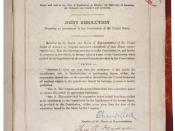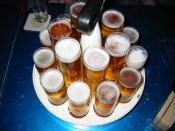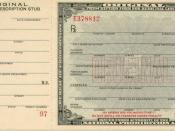The Constitution's 18th Amendment was changed on January 16th 1920 so that the creating, distribution and consumption of alcohol became against the law. The government considered this move a noble experiment and was supported by groups such as the Anti-Saloon League who were known as "Dries". During the early 1800s Dries began a temperance movement based on the belief that "King Alcohol" had created 75% of pauperism and crime in America and more than 50% of the insanity (National Temperance Almanac 1876). Those who were in support of alcohol were known as "Wets". During WWI "Dries" claimed that the US German brewers should not be supported because that would be unpatriotic. Furthermore, they claimed that alcohol had caused German aggression. An Anti=Saloon League pamphlet stated that it was the American's patriotic duty "to abolish the un-American, pro-German, crime-producing, food-wasting, youth-corrupting, home-wrecking, treasonable liquor traffic".
Prohibition was a time of corruption (which included police, judges and local/state government officials).
Chicago lawyer E. Gertz commented "Prohibition taught America disrespect for the law...most people thought there was nothing wrong, particularly when they knew the President was serving alcohol in the White House". During Prohibition alcohol was secretively brewed, distributed and consumed - at much higher prices. 'Stills' were home-based breweries (there were 282, 122 in 1930) which produced alcohol. However, sometimes the alcohol was poisonous and caused illness. A "speakeasy" was a basement bar behind locked doors with peepholes. New York contained 32, 000 in 1929 - the most notorious being the '21 Club'. Bootlegger gangs transported liquor and this made them powerful and rich. A bootlegger, daring enough to risk imprisonment if caught, could earn around $2million annually. They were helped by the low-paid Prohibition Bureau who would often succumb to bribery. 'Two-gun' Hart, who made numerous arrests in Montana,



Great!
this is just what i have been looking 4! thank u so much!
0 out of 0 people found this comment useful.